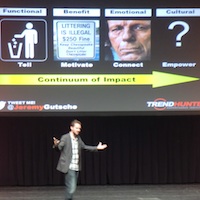
In the opening keynote speech at InfoComm 2013 on Tuesday, trend spotter Jeremy Gutsche gave the audience a number of tips for developing their businesses, and also discussed a few salutary examples of companies that squandered their market-leading status because they failed to embrace change.
Blockbuster had three opportunities to buy Netflix. Kodak invented digital photography. But the example that Gutsche discussed in detail was Smith-Corona – a highly innovative technology company for over 100 years. For decades it made traditional typewriters, and latterly invented grammar checkers, electronic dictionaries and laptop word processors. However, it failed to embrace the world of the computer. One possible explanation is that competitor Remington-Rand, the inventor of the typewriter, got into computers in 1975, but went bust in 1981. “When your competitors falter, you start to think, ’Let’s not do what they did’,” said Gutsche, founder of www.trendhunter.com. In fact Smith-Corona went into a joint venture with Acer in 1991, but pulled out of the deal in 1992, believing that there was still a market for its products – one of which was like “a laptop ten years ahead of its time, with a printer built inside it”. However, the company went bust in 1995. “When a company’s big and successful, you don’t feel like you need to try,” he said. “
“Situational framing dictates the outcome of your creative process – you’ll solve the problems you want to solve. Smith-Corona wanted to be the best typewriter company in the world… but if they thought about the experience they were creating, which was helping people record their thoughts, they would have had to stay in computing.”
For this reason, Gutsche recommends that companies should be able to answer the question ‘What are you trying to do?’ – or alternatively ‘Why should I choose you?’ – in seven words or fewer.
Companies should also be open to the possibility of failure, he said. Following a period of strict management controls, the BBC created a ‘gambling fund’ for programme ideas that did not meet existing guidelines. One of the programmes that came to be made from this fund was The Office – the corporation’s most successful comedy export ever.
Gutsche also described a ‘continuum of impact’ of marketing communications. At the basic level is to describe product features, functions and specifications. The next level is to talk about benefits. Above that is making an emotional connection – “ but that doesn’t really rigger a purchase”. The next level – the ‘holy grail’ – is making a cultural connection. “With a cultural connection, I perceive you as being on the same team. You’re trying to understand how you can help me win.”
One example of a cultural connection was the slogan ‘Don’t Mess With Texas’ was created for an anti-litter campaign – chosen because it was an aggressive campaign, initially fronted by sports stars and other icons, that spoke to young males most likely to drop litter from their cars and trucks. This led to a 72% fall in littering – unlike the ‘Keep America Beautiful’ campaign from the 1970s, featuring a weeping native American, which, although frequently cited in marketing textbooks, had little measurable impact.
To create a cultural connection requires getting a deep understanding of the customer – which is best done by “observing customers in their zone, interacting with them, and watching them choose,” said Gutsche. This may involve companies “putting themselves in awkward places to gain insight” – such as General Motors, which researched why its Cadillac Escalade SUV had become popular among hip-hop fans by flagging down drivers in a dangerous part of Detroit and asking to ride with them as they went about their daily business. “If you only interact with customers when you’re selling to them, you’re not listening to them,” he said.






